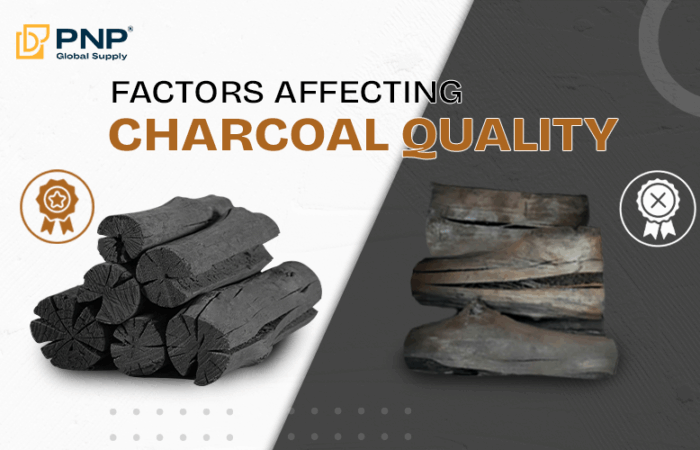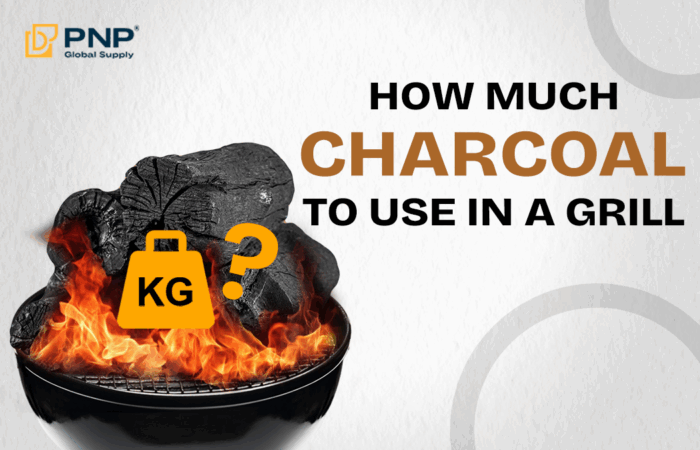For charcoal wholesalers, managing bulk charcoal orders involves more than just purchasing and shipping products—it also requires proper storage and handling. Whether you sell hardwood lump charcoal or other types of charcoal in large quantities, the way you store charcoal directly affects its quality, performance, and lifespan. This guide provides essential tips for charcoal wholesalers on how to store charcoal safely, maintain its premium condition, and avoid costly losses during long-term storage.
1. Why Proper Charcoal Storage Matters for Wholesalers
Charcoal is a porous, carbon-rich material that easily absorbs moisture from the surrounding environment. When not stored correctly, it can lose its heating efficiency, produce excess smoke, and even become a safety hazard. For charcoal wholesalers who buy charcoal in bulk, maintaining consistent quality throughout storage and shipping is critical to protecting both reputation and revenue.
Environmental conditions such as humidity, direct sunlight, and temperature fluctuations can degrade charcoal over time. For example, hardwood lump charcoal—known for its high heat and low ash content—can quickly lose performance if it absorbs moisture. Poor storage can also lead to cracking, mold growth, or spontaneous combustion under certain conditions. Therefore, understanding the principles of safe charcoal storage is key for every wholesaler.
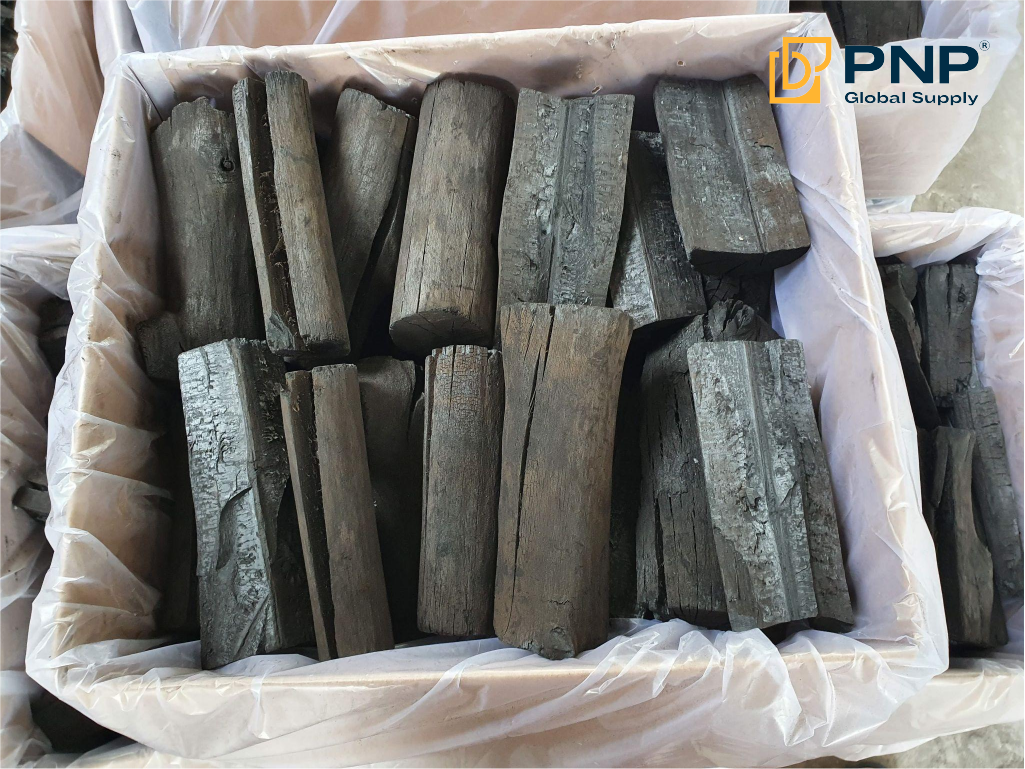
2. Common Types of Charcoal Wholesalers Store
Different types of charcoal require slightly different storage approaches due to their structure and raw material composition:
- Lump charcoal: Natural wood-based charcoal with excellent heat output and minimal ash, but prone to moisture absorption.
- Briquette charcoal: Densely compressed and uniform, easy to stack and store efficiently in bulk.
Recognizing these differences helps wholesalers apply suitable storage for charcoal that matches their inventory type and shipping plans.
At PNP Charcoal, we specialize in supplying premium lump and briquette charcoal for global wholesale partners. Visit our website: PNP Charcoal to explore high-quality, export-ready charcoal and reliable bulk solutions for your business.
3. How to Store Charcoal Bulk Orders Safely
When it comes to bulk storage, prevention is always better than correction. The following practical guidelines explain how to store charcoal properly in warehouses, containers, and during transportation.
Choose the Right Storage Location
The first rule of charcoal storage for wholesalers is to keep it dry and well-ventilated. Moisture is the biggest enemy of charcoal, as it lowers calorific value and can cause combustion risks.
- Dry area: Always store charcoal in a covered, roofed facility to prevent exposure to rain or ground moisture.
- Avoid direct sunlight: Constant heat may increase the risk of self-heating.
- Temperature & humidity control: The optimal humidity level should be below 8%. In tropical climates, using industrial dehumidifiers or large fans can help regulate air circulation.
Wholesalers dealing with hardwood lump charcoal should pay extra attention, as this type absorbs moisture faster than briquette or coconut charcoal.
Stacking and Placement Techniques
Proper stacking ensures both safety and airflow within the warehouse.
- Use pallets or racks: Always elevate charcoal bags at least 10–15 cm off the ground using wooden pallets or steel frames to prevent moisture absorption from the floor.
- Avoid overcrowding: Leave sufficient space between stacks for ventilation and easy inspection.
- Stack height: Keep the pile under 2 meters to prevent bag compression and reduce fire risks.
- FIFO method: Although this is optional, wholesalers who frequently order charcoal should rotate inventory using the First-In-First-Out system to ensure older batches are shipped first.
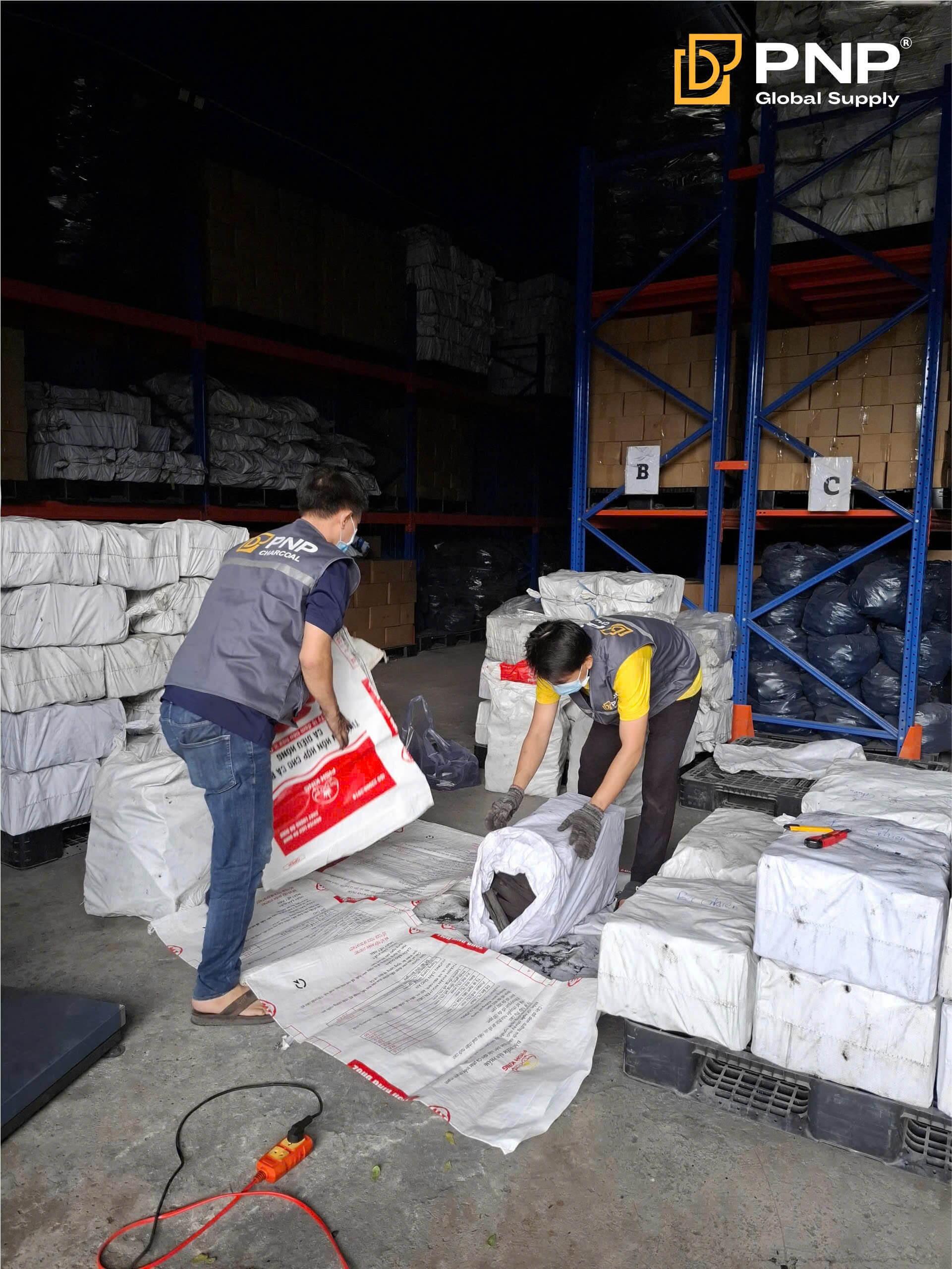
Packaging and Protection
The right packaging plays a major role in maintaining charcoal quality during long storage periods.
- Moisture-resistant bags: Use PP woven bags with PE inner liners or multi-layer kraft paper bags to prevent humidity infiltration.
- Sealed packaging: After every order fulfillment or inspection, reseal open bags to avoid air exposure.
- Extra protection: For long-term storage or international shipments, use PE film wrapping, desiccant packs, or container liners to minimize contact with moisture.
Investing in durable packaging materials is a small cost compared to the potential losses from spoiled or damp charcoal.
Container Storage and Long-Distance Transport
For exporters and large charcoal wholesalers, understanding container storage techniques is crucial when shipping overseas.
- Dry containers only: Make sure containers are clean, dry, and free from previous cargo residue.
- Use pallets inside containers: Keep all charcoal bags elevated and ensure airflow between them.
- Thermal liners and desiccant packs: These prevent humidity build-up and condensation, which are common causes of mold and heat reactions during long voyages.
- Labeling: Mark containers clearly with “Flammable Material” and “Keep Dry” labels to comply with safety standards.
- Monitor conditions: Install humidity and temperature sensors if the storage or transit duration exceeds two weeks.
Following these steps ensures the charcoal maintains its original burning quality even after long-distance transportation.
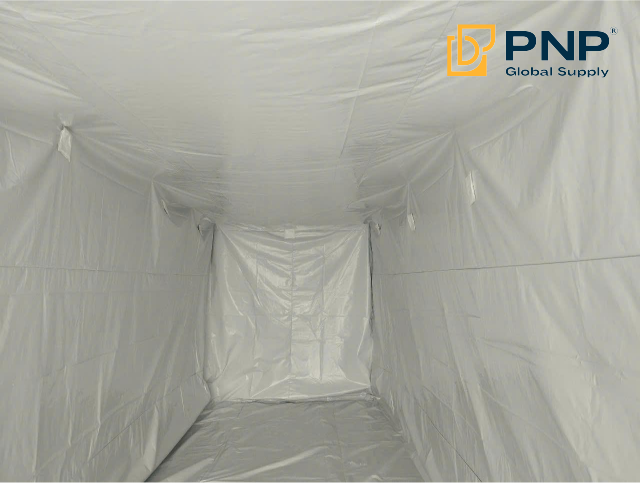
Routine Inspection and Maintenance
Regular inspection is vital for identifying early signs of damage.
- Check every 2–3 weeks: Inspect for unusual odor, mold, moisture spots, or bag deformation.
- Separate damp charcoal: If some bags show moisture absorption, isolate them immediately for re-drying before they affect other stacks.
- Fire safety readiness: Keep fire extinguishers, sand buckets, or automatic alarm systems nearby in case of emergency.
With consistent monitoring, charcoal wholesalers can maintain storage efficiency and product reliability over time.
If you’re a charcoal exporter and want to learn more about proper packaging methods for safe international shipping, check out the following article: How to Pack Charcoal for Business Import Export
Preparing an Efficient Charcoal Warehouse
An organized and secure warehouse layout supports better control over large inventories.
- Design with airflow in mind: Ensure proper ventilation, either natural or with exhaust fans.
- Implement safety zones: Separate the area where you store charcoal from other combustible materials or machinery.
- Install fire prevention systems: Fire extinguishers, sprinklers, and emergency alarms should always be operational.
- Signage: Use visible labels like “Flammable – No Smoking” to minimize workplace hazards.
A well-managed warehouse not only extends charcoal shelf life but also improves operational efficiency and worker safety.
Common Mistakes Charcoal Wholesalers Should Avoid
Even experienced wholesalers can make small mistakes that lead to big losses. Here are common issues to watch out for:
- Storing charcoal outdoors or directly on damp ground.
- Neglecting humidity control during the rainy season.
- Overstacking bags or placing them too close to walls, limiting airflow.
- Using thin, non-sealed packaging that tears easily.
- Ignoring regular inspections or temperature changes inside containers.
Avoiding these mistakes ensures consistent product quality and smooth business operations.
Conclusion
For charcoal wholesalers, maintaining the right storage for charcoal is as crucial as sourcing it. Proper storage not only preserves heat efficiency and reduces spoilage but also ensures safety across the supply chain. By following these guidelines—from selecting a dry warehouse to using moisture-resistant packaging and regular inspection—wholesalers can protect their investment and guarantee that every bulk shipment arrives in perfect condition.
If you’re planning to buy charcoal in bulk or looking for the best way to store charcoal efficiently, partnering with a reliable supplier and implementing professional warehouse management practices will give your business a long-term advantage. Proper care today ensures your hardwood lump charcoal or other charcoal types maintain top performance tomorrow.
________________________________
Contact us for more information
Facebook: PNP Charcoal
Instagram: PNP Charcoal
Email: info@pnpglobalsupply.com

